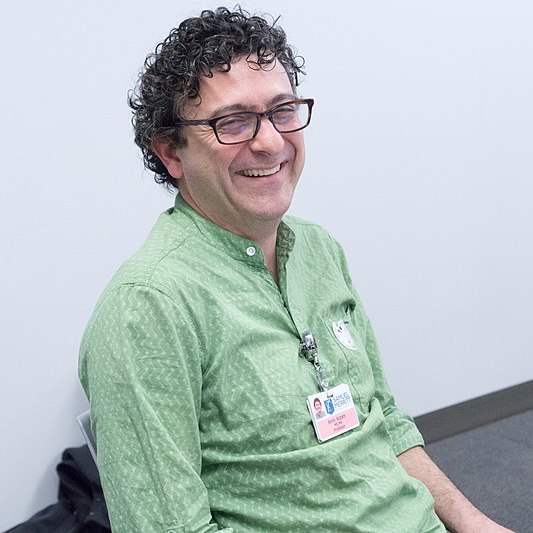Dr. Amin Azzam, MD, MA, Adjunct Professor at the UCSF School of Medicine shares how health professional students are improving Wikipedia as part of their formal curricula.

Since 2013 I’ve had the great privilege of running a Wikipedia-editing elective course for fourth year medical students at the University of California, San Francisco (UCSF) School of Medicine. My course has a month-long “immersion rotation” structure—the students do not concurrently enroll in other courses, and my entire course is dedicated exclusively to Wikipedia efforts. Between the fall of 2013 and spring of 2019, I’ve had 160 students, ranging from as few as 5 to as many as 39 in a course. Collectively, my medical students have made 6,138 edits to 147 pages, adding 344,058 words to pages viewed 4,113,057 times during their course’s active days. I’m proud of all of my students’ tremendous efforts.
Beginning in 2016, I’ve also been supported by grants from the Hewlett Foundation to promote Open Educational Pedagogy (OEP). I like defining OEP as a curricular strategy where students learn by producing open educational resources. And since we all know Wikipedia is the quintessential open educational platform, it should come as no surprise that I encourage other health professional school faculty to embrace editing Wikipedia with their students in their schools. Through Wiki Education’s “Students in the Health Professions” campaign, there have now been 857 students across 30 courses that have added 613,000 words to 406 health-related Wikipedia pages. And those pages have been viewed a whopping 16.1 million times since students improved them.
As I’ve helped innovative faculty at other health professional schools, I’ve been struck by just how many creative strategies they’ve employed in bringing Wikipedia to their curricula. With apologies to any that I’ve inadvertently left out, here’s my explicitly unscientific categorization of their approaches:
- As an assignment within an existing course (e.g. a “health policy” course)
- Embedded into an “educator track” (e.g. for students interested in becoming future teaching faculty)
- As a component of information seeking & application threads (a critical skill for all health professionals to develop)
- As a service learning option (e.g. learn while also providing services to patients that you’re learning from)
- As part of a profession-specific competency-based framework (most often practice-based learning or systems-based practice)
- As a component of required patient education activities (another skill all health professionals should develop)
- As an optional “edit-a-thon” in partnership with faculty and staff, and
- As a stand-alone course (similar to my own approach).
I’ve also been struck by the diversity of number of and year-in-training of students in these courses. I’ve seen independent 1:1 student-faculty efforts, and courses of over 100 students. The students range from early first years to those imminently graduating into their future health professional roles. I’ve also seen truly collaborative efforts with local librarians as co-instructors or even lead instructors. The health professions that have already joined the movement include medicine, pharmacy, public health, and physical therapy. Lastly, a huge shout out to a consortium of 7 dental schools in the UK. They’re systematically dividing up the dental content on English Wikipedia—so there’s no accidental duplication of student efforts across their schools.
Reflecting back on when I first created my course 5 years ago, I used to warn my medical students about being “out” about my course on their interview trails for their next professional steps. I’d say, “Most of your faculty and senior professionals still shun Wikipedia as inadequate and unprofessional.” But more recently I’ve stopped that caveat. My students—and all health professional students who edit Wikipedia—SHOULD be OUT and PROUD about making the world’s most heavily used health information source more accurate and thorough. Can you imagine a world where everyone has access to high quality health information for free? I sure can, and I’m grateful to be a part of that movement.
Students are making a real impact with their work. For an example, read this piece by Dr. Azzam’s recent student about his editing Wikipedia’s vaccination article. Or this research published in MedEdPublish in July of this year.
Medical content on Wikipedia must adhere to stricter sourcing standards than other content. That’s why Wiki Education has a medical-specific training for students and why on-Wikipedia groups like WikiProject Medicine exist. Our medical topics training joins Wiki Education’s suite of resources, accessible for free through our Dashboard. Sign up at teach.wikiedu.org to utilize these tools and to receive staff support for your next Wikipedia project.
